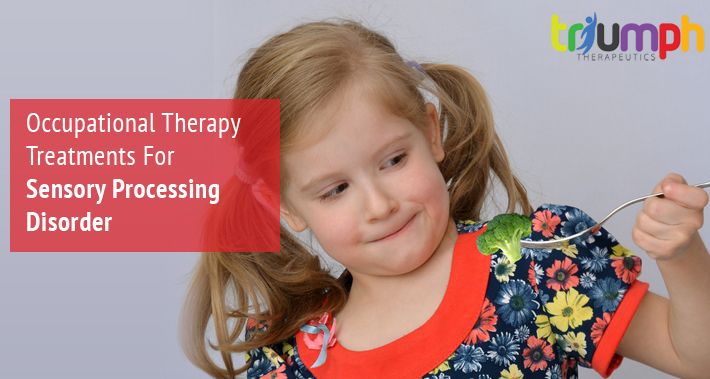Occupational Therapy for Sensory Processing Disorder
https://www.triumphtherapeutics.com/wp-content/uploads/2021/11/Triumph-Therapeutics-Speech-Therapy-OT-Physcial-Therapist-Washington-DC-Nov01-01-2021.jpg 710 379 Triumph Therapeutics Triumph Therapeutics https://www.triumphtherapeutics.com/wp-content/uploads/2021/11/Triumph-Therapeutics-Speech-Therapy-OT-Physcial-Therapist-Washington-DC-Nov01-01-2021.jpgHave you noticed that your child may seem to be unusually selective with or even have an aversion to certain everyday activities?
Do they have a tendency to complain about their clothes, shoes or other accessories they wear being uncomfortable, tight or itchy?
Does your child have an aversion to brushing their hair or teeth?
Maybe they’re frustratingly picky about what they eat?
Or maybe they periodically seem to get overwhelmed all of a sudden and for no apparent reason, and break down into a temper tantum?
If any of this sounds familiar to you, your child may suffer from sensory processing issues that may be affecting their day-to-day lives and could benefit from occupational therapy for sensory processing disorder.
Here at Triumph Therapeutics, our pediatric therapy clinic in Washington DC can help.
Let’s take a closer look at sensory processing disorder.
What Does Sensory Processing Mean?
Sensory processing is the means by which your mind and body gathers, sorts and files information about your environment.
It’s essentially how you interact with and experience the world, both externally and internally.
Sensory processing is divided into eight main categories:
- The five senses: sight, smell, taste, touch and sight
- Interoception: your sense of how you feel, which includes everything from how you perceive the temperature of the room around you to how you interpret your emotions.
- Proprioception: the internal sense you have of your body, which includes how you perceive yourself to be sitting, standing, moving and occupying space
- Vestibular: your sense of balance and coordination, having much to do with the inner ear and spatial recognition
What Happens With Sensory Processing Disorder?
If you or your child has sensory processing disorder, they have a difficult time receiving, processing and responding to the information that their mind and body gathers about the world around them and how they interact with the world.
Left untreated, this disorder can lead to behaviors and reactions that are difficult to manage and can interrupt everyday life.
It can affect the way that a child interacts with the world around them and make everyday tasks, such as brushing their hair, or scenarios that would otherwise be fun and exciting, such as an amusement park, overwhelming, uncomfortable and absolutely unbearable.
Sensory Processing Disorder Symptoms
Common symptoms of sensory processing disorder in children can include:
- Sensitivity to or avoidance of light, sound and/or smells
- Resistance to hugging or touching
- Picky eating
- Particularity when it comes to how items of clothing feel or fit
- Hyperactivity
- Tendency towards clumsiness
- A low pain threshold
- Avoidance of everyday tasks that can feel unpleasant
- Seemingly random temper tantrums
Sensory processing disorder frequently overlaps with autism spectrum disorder as well, so your child may also show symptoms of the latter.
Sensory Processing Disorder Causes
While some doctors and medical professionals believe sensory processing disorder to be a component of another issue rather than its own distinct disorder, its direct cause is currently unknown.
Despite a lack of clarity in regards to the direct cause of the disorder, the medical community has been able to shed some light on which children may be more predisposed to developing sensory processing disorder.
As mentioned above, autism spectrum disorder and sensory processing disorder occur along with each other frequently.
But it also commonly overlaps with obsessive compulsive disorder (OCD) and attention deficit hyperactivity disorder (ADHD).
Children with anxiety or heightened fear responses also seem to be more likely to have an issue with how they process sensations.
There may also be a genetic component at play, as well as influences from factors such as whether a child experienced complications at birth or was born prematurely.
It’s worth noting too that sensory processing disorder doesn’t seem to develop later in life.
While some people don’t discover they have this disorder until adulthood, it would have always been there.
How Can An Occupational Therapist Help With Sensory Processing Disorder?
Occupational therapists use a number of treatments to help those with sensory processing disorder reach their full potential.
Many children with sensory processing disorder can find certain activities unpleasant or uncomfortable because of their disorder and, as such, often end up avoiding certain tasks or activities.
These tasks are often a part of a child’s everyday life and can include everything from brushing their hair or teeth to going to a park on a sunny day.
In working with an occupational therapist, your child can develop strategies and learn to do activities that they would otherwise avoid because of sensory issues.
This can help them cope with and manage behaviors and reactions that would otherwise interfere with everyday life.
Here at Triumph Therapeutics, we start with a pediatric evaluation of your child.
The idea here is to discover whether it’s sensory processing disorder or something else that’s causing your child’s symptoms.
From there, your pediatric occupational therapist will work with your child to help manage their sensory processing disorder.
Every child is different, and so each approach is custom tailored to your child’s needs.
However, their treatment may include:
- Physical contact to stimulate their sensory processing and teach them to focus
- Brushing – a technique using a soft brush to provide gentle pressure on points that trigger their sensory processing disorder symptoms the hardest
- A sensory gym, like the one we have at our facility, which allows them to experience sensory inputs in a more comfortable environment
- A sensory diet – this can include certain foods, as well as other sensory inputs to help them learn how to better process
Book An Appointment With Triumph Therapeutics Today
Do you believe that your child may be displaying symptoms of sensory processing disorder?
If so, we can help.
Book your appointment with Triumph Therapeutics today.


